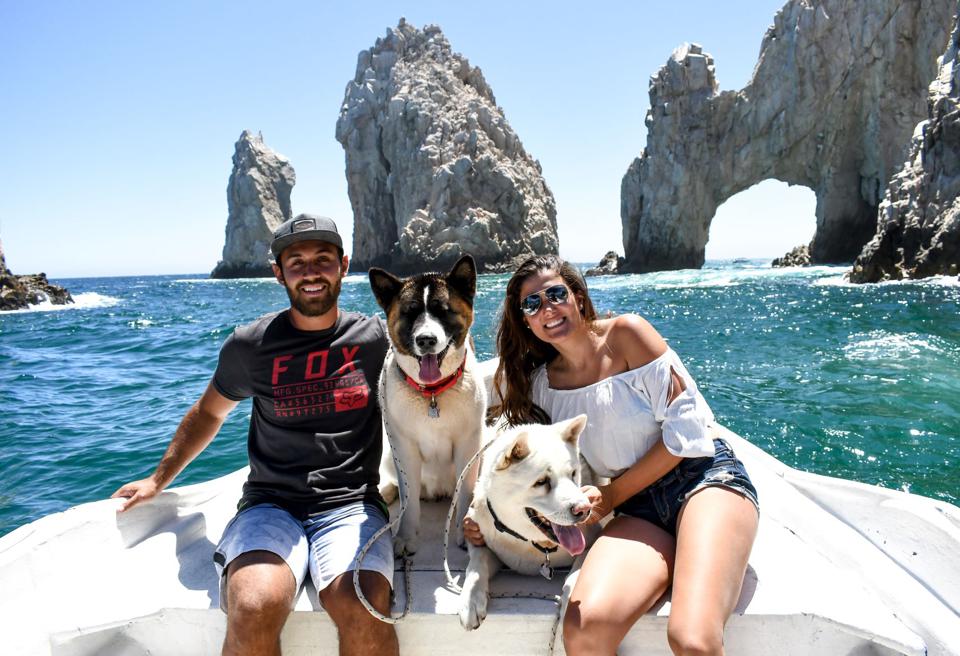
Family life at sea
Andrea Palacio and Alejandro Zuluaga
Three years ago, just three months after they got married, Alejandro Zuluaga and Andrea Palacio decided to make a monumental and life changing decision. The couple, both originally from Colombia had lived in the United States since childhood and had become disenchanted with living life in a consumerism led society.
Packing up their bags and giving notice at their corporate jobs they rented out the two empty rooms in their house and sold their cars. Within a few months they moved with their dogs Ozzy and Echo, to Dominican Republic to learn how to kite surf, and now they all live on their sailboat, Hakuna.
We asked them all about their exciting and nonconventional lifestyle.
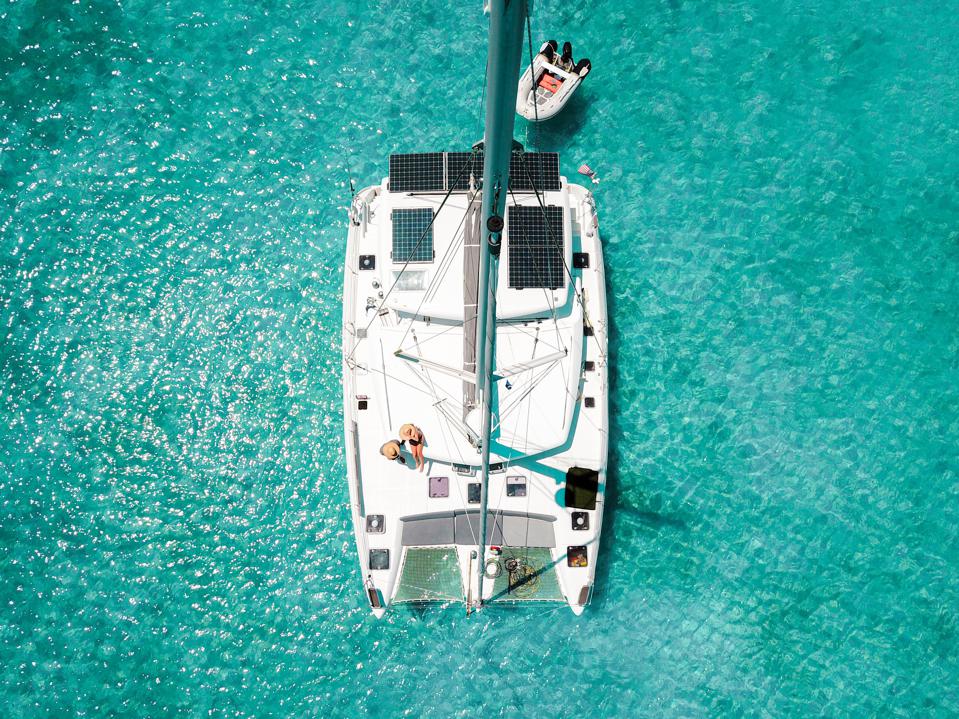
Life onboard
Andrea Palacio and Alejandro Zuluaga
Did you have a background in boating or sailing?
Alejandro: No, when we bought our sailboat, we had no idea how to sail or drive a boat. In fact, the last time I was on a sailboat was when I was five years old, and Andrea had never even stepped foot on sailboat!
Recommended For You
What are some of the challenges of living at sea?
Alejandro: The biggest challenge is that everything breaks all the time, and you don’t have a professional to help you fix it so you learn to become an electrician, plumber, janitor, mechanic, you name it.
The weather is also a challenge because when a storm comes, you’re at the mercy of Mother Nature. Giant waves, thunderstorms and hurricanes are all scary when you live on a boat.
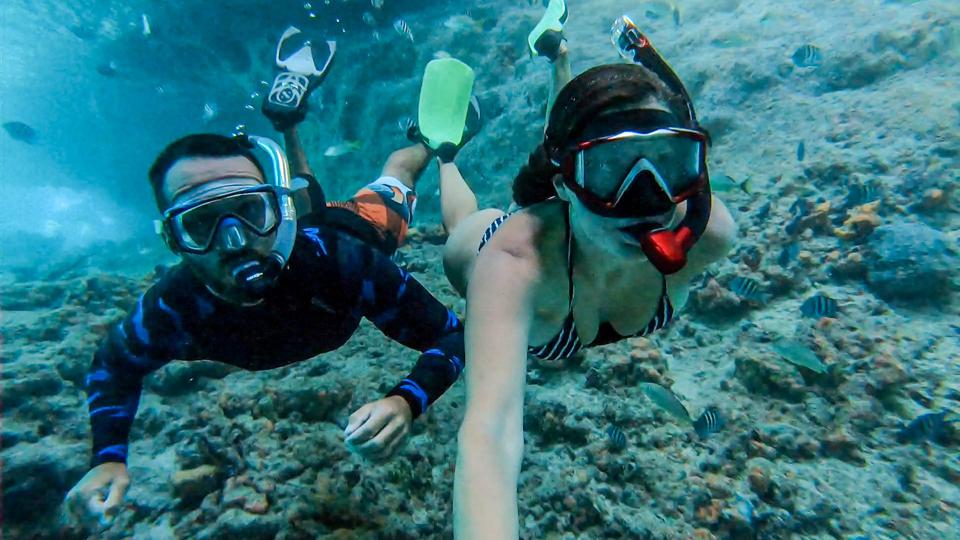
Life at sea
Andrea Palacio and Alejandro Zuluaga
Are there any parts of life on land that you miss the most?
Andrea: What we miss the most is the ease of getting groceries or anything you need. Alejo used to love going to the supermarket to buy ice cream, or if we were missing something we could just go and get it in 15 minutes. Now, it’s a HUGE process.
We need to find a place to anchor near land, go on the dinghy to a dock, get an Uber, etc. It takes us almost a full day and obviously, we can’t buy ice cream anymore because it’s melted by the time we’re back on the boat.
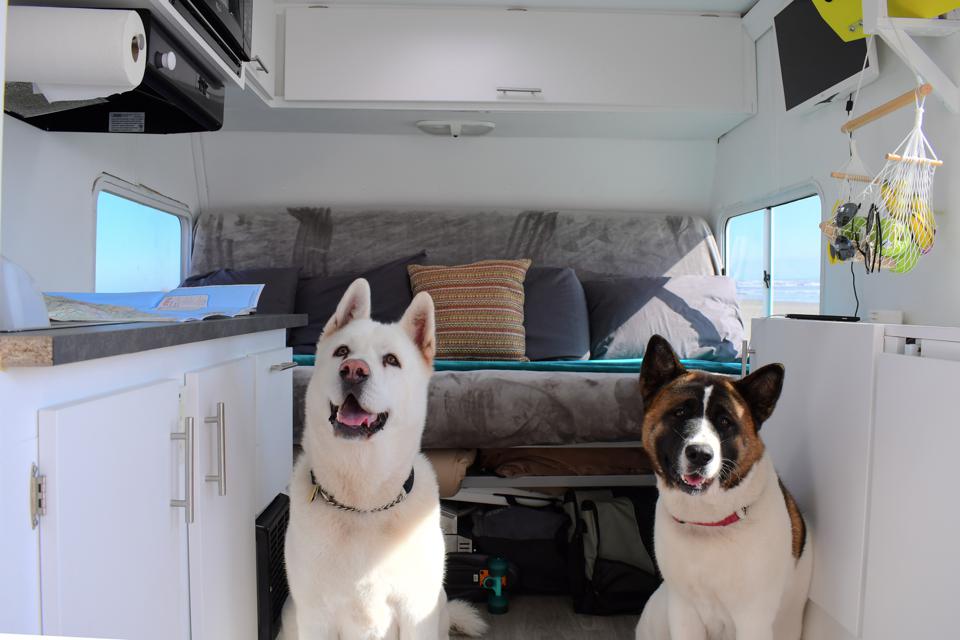
Ozzy and Echo
Andrea Palacio and Alejandro Zuluaga
How did the dogs adjust to life on the boat?
Alejandro: They adjusted a lot better than we expected. Echo lost her sight completely one month before we bought the boat, so we were nervous about moving on board. But she learned to listen to us for instructions on when to jump in and out of the boat. Now she knows every corner of the boat and we call her Echo Phelps because she loves swimming and can stay in the water for as long as we let her!
They both go to the bathroom on the artificial grass we have on deck for them, which helps a lot when we’re sailing. But since most of the time, we’re anchored somewhere, they really enjoy swimming or running free around the beach everyday. They’re also the ones that spot the dolphins all the time.
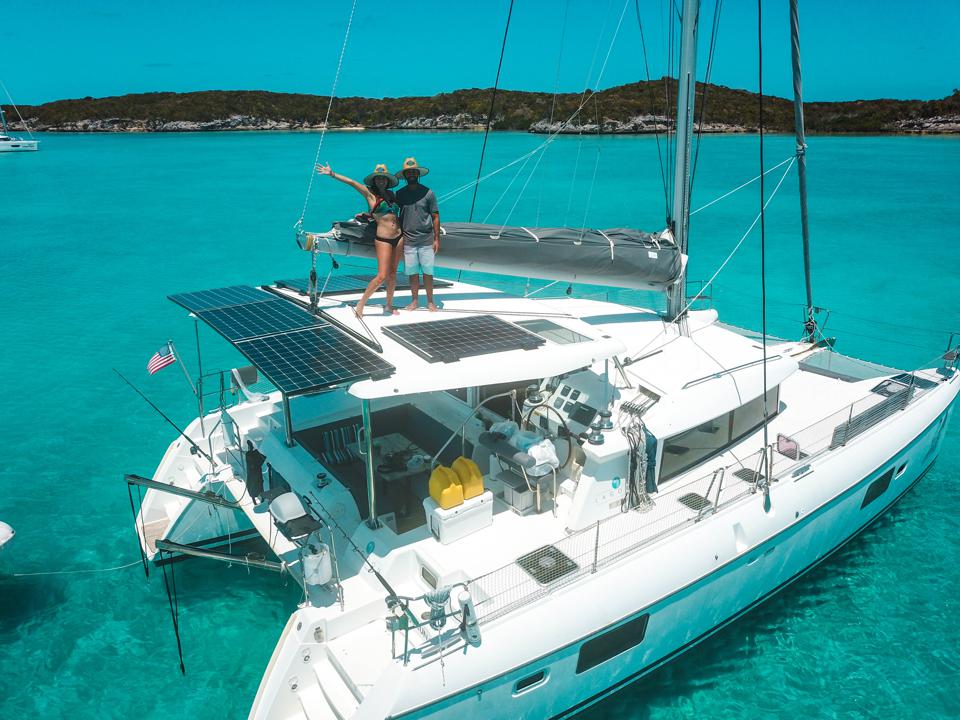
Living Hakuna
Andrea Palacio and Alejandro Zuluaga
Do you have tips for living and working in a small space?
Andrea: We spend about 90% of our time working and the other 10% is when we get to do the things that are fun or adventurous. For us, the best habit we have is simply following a routine that makes sense for most days. Having some kind of structure helps us feel like we have a normal life that requires discipline, hard work and dedication.
We also manage to stay busy all the time, and if anything, we need more time to do all the things we want get done. I think it can get exhausting to be looking at the same tiny space all day if you’re not doing anything so it’s important to find things to do. Whether it’s exercising, working, learning, reading, or exploring, these are all things that you can do in a small space. It’s all about reinventing yourself everyday.
The last tip would be to establish roles and know who is doing what. When you’re living in a small space with two giant dogs and running two businesses together, things can get rough. I’m glad we’ve gotten pretty good at this because we really struggled at first!
So, the tip would be to just make sure you have goals in common and base your work and tasks on your strengths. For example, I’m terrible at doing boat work because I don’t know when to use a drill or a screw driver so Alejandro does that, and I focus on editing or working on other things that actually I’m good at.
Tell us about your adventure gear and the sports you enjoy together.
Alejandro: We have kitesurfing gear, kite foil, fishing, snorkeling, paddle boards, and a kayak. But our favorite by far is kiteboarding, it’s what got us into this lifestyle in the first place.
After we learned, we were hooked, and now we just set our schedule around the wind so we can kite as much as possible. We’re also planning on getting scuba diving gear before we head to the Bahamas in November as we don’t want to miss out on any adventures next season.
How would you describe an “alternative lifestyle”?
Andrea: To me an alternative lifestyle would be any form of living that goes outside of the traditional way of doing things, such as living in a house or apartment. It could be anything from living on a boat, van, tiny house, or bus, to living in different places as you travel the world full time. Or simply living off the grid in a cabin out in the woods with self sustained resources.
We even met a family traveling on bicycles with tents from Alaska to Argentina, and this is also an alternative lifestyle because it’s a completely atypical way of living life, requiring you to get out of your comfort zone.
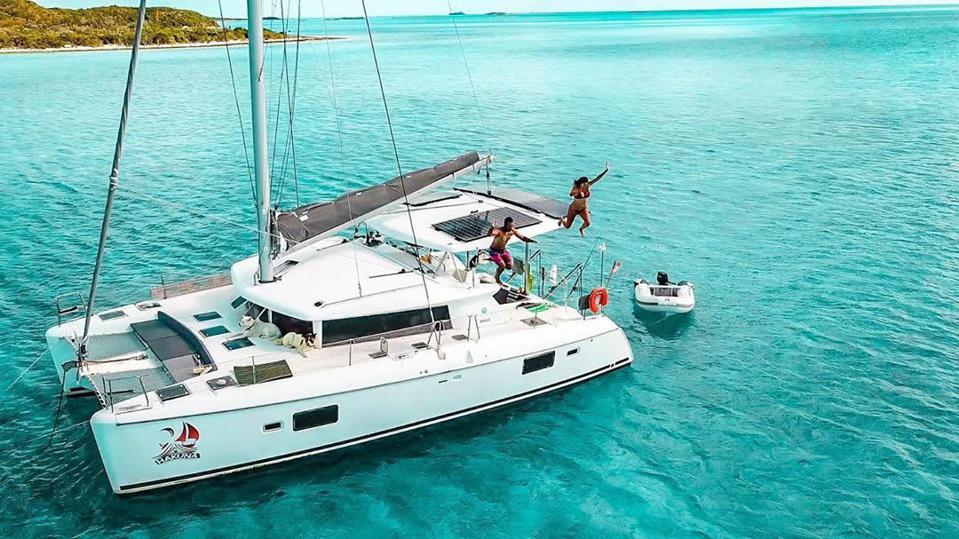
Taking the leap
Andrea Palacio and Alejandro Zuluaga
What are the benefits of living this way?
Andrea: When you live at sea, you’re a lot more connected with nature and wildlife. You experience things that you probably wouldn’t otherwise, like swimming with sharks and dolphins in the wild. And you learn the importance of appreciating the ocean and all the marine life in a respectful and sustainable way.
You’re also free to travel the world in the comforts of your own home, and you get to see places that you can only access by boat, while meeting people that live a similar way.
Other benefits would be that you’re forced to become resourceful and skilled at many things. And that your carbon footprint is very small compared to traditional lifestyles.
Tell us about your remote business and how you make it work for you?
Andrea: Our primary business is Mokai, a brand of health supplements and grooming supplies for pets. We sell our products on our website, Amazon, eBay, and other small sites, this allows us to work from anywhere as long as we have an internet connection. Our manufacturer helps us keep our inventory and ships it as needed, and when we need a little more help that requires our presence, Alejandro’s parents give us a hand.
Our second business is our YouTube channel, Living Hakuna, where we share everything about our lifestyle. Luckily, three months ago we found a good internet provider so now we’re able to get high speed internet anywhere in the U.S., Bahamas, Puerto Rico and USVI so we have no issues getting work done or uploading videos.
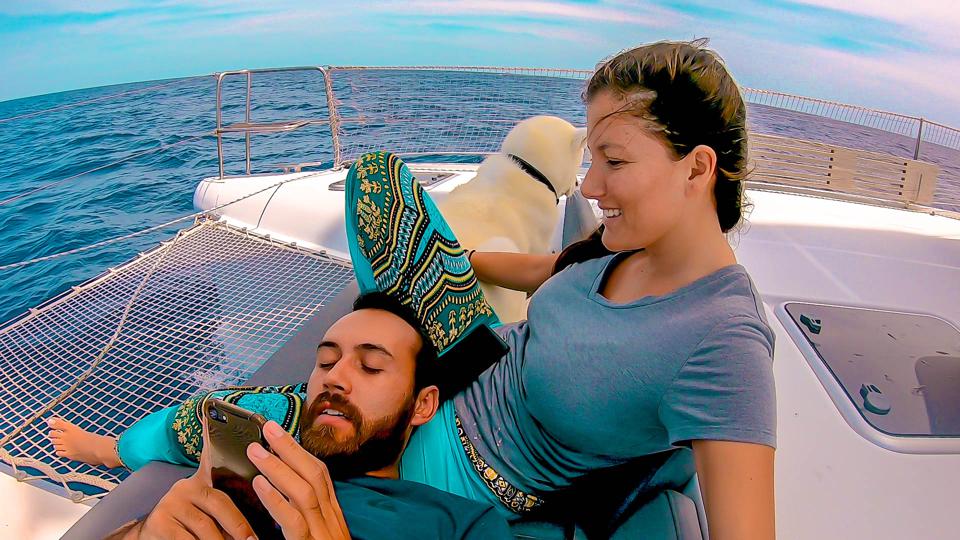
Relaxing on the boat
Andrea Palacio and Alejandro Zuluaga
What are some of the sustainable and eco-friendly elements of your current lifestyle?
Andrea: The best part of having a sailboat is that we travel with the wind, meaning we use very little fuel, usually only to set our anchor. Hakuna also has 1,800 Watts of solar panels and 850 Ah of lithium batteries, which fully powers the boat with solar energy.
We also use a water-maker that desalinizes salt water and turns it into drinkable water. And in terms of food, Alejandro buys chicken once in a while, but we mostly catch what we eat.
What does an average day look like for you both?
Alejandro: We normally wake up at around 7:30, have breakfast and feed the dogs. We exercise on the deck of the boat for about an hour and then take the dogs out for a walk.
Once we get back on the boat, we work for about four hours, and if it’s windy we kitesurf for an hour or so. Once we’re done, we have lunch and get back to work until 6:30 or 7pm. We take the dogs out again and by that time, we’re ready to call it a day so we just go to bed, eat something and watch Netflix.
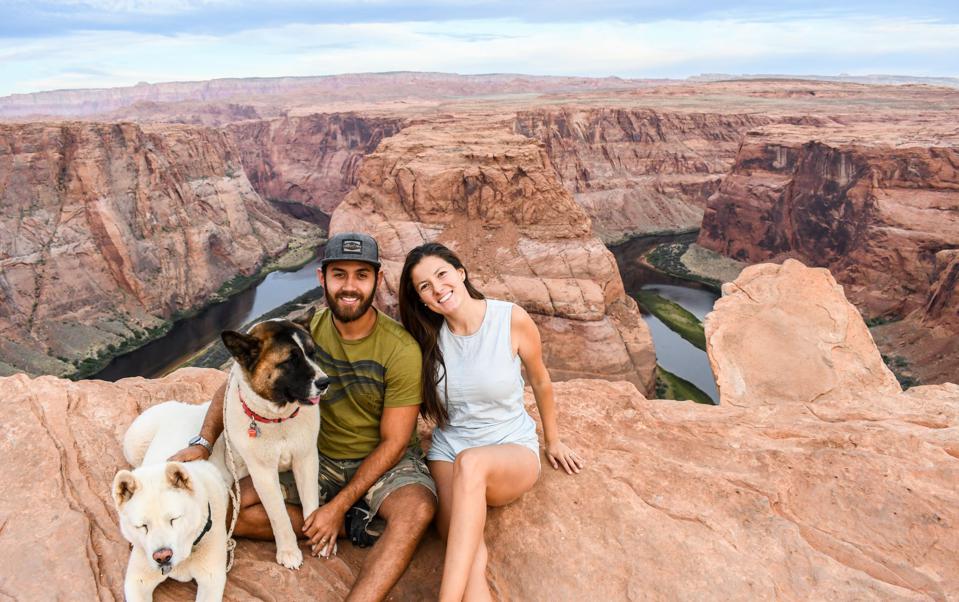
Family adventures
Andrea Palacio and Alejandro Zuluaga
Has Covid-19 changed life at all for you, if so how?
Alejandro: It changed our plans a lot since our goal was to make it to Grenada for hurricane season. We were in the Bahamas when Covid-19 blew-up and all the islands closed. The Bahamas prohibited cruisers to go on land, so we had to get the groceries delivered to our boat, and get the trash picked up where we were anchored.
Eventually, we had to sail back to the U.S. to protect our boat from the hurricanes. Once hurricane season is over, we plan on sailing down to the Caribbean but the places we visit will depend on the travel restrictions but overall, we feel very fortunate and safe since social distancing is a normal day for us.
You can also follow the couple’s adventures on their Instagram account livinghakuna.

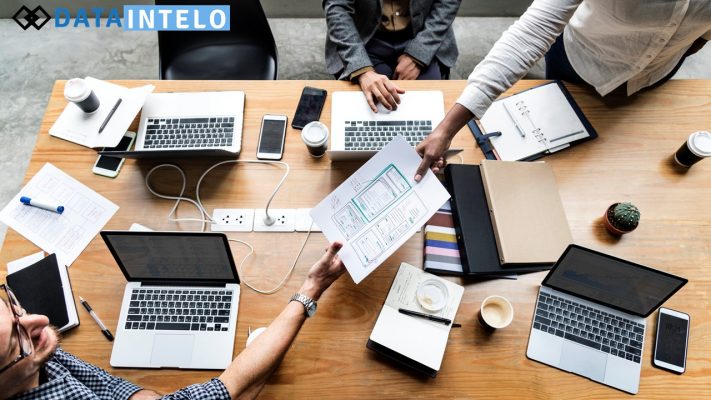
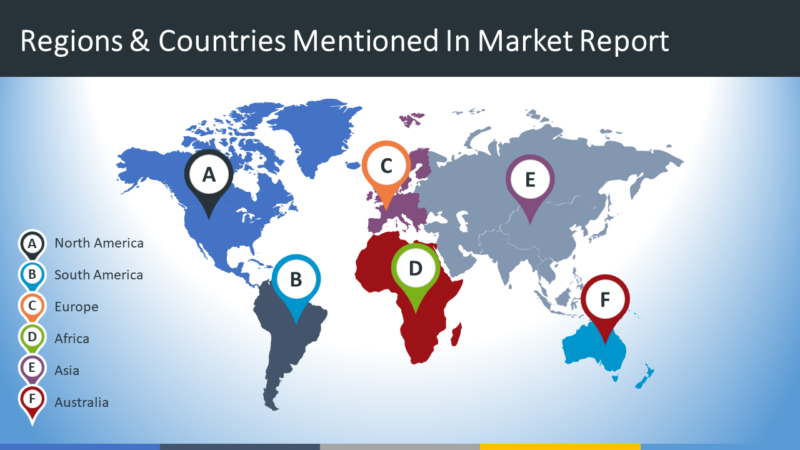

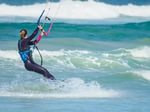
Recent Comments